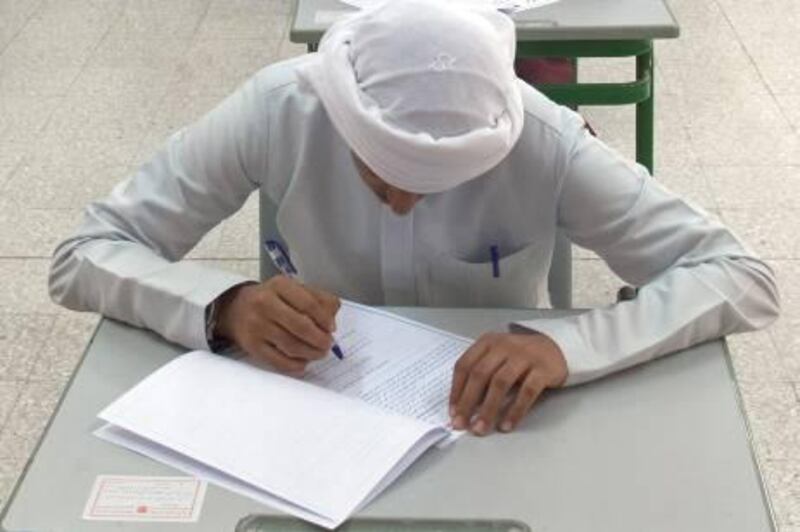ABU DHABI // A generation of children has been let down by the absence of a clear vision for the national curriculum, a lack of accountability and constantly changing school strategies, a leading education adviser said yesterday.
Despite reforms costing about Dh400 million, pupils at national curriculum schools continue to perform poorly in maths, science and literacy, and require remedial classes to prepare for university.
MORE ON EDUCATION
Inspectors take fresh look at 'problem' university Ittihad University in RAK suffered a rare measure - being put on probation - after ministry officials visited in March. Now they are back. Read article
Teachers criticise apathetic parents Three-quarters of public school teachers say their pupils are out of control, and officials blame it on a lack of involvement by parents. Read article
EDITORIAL: Can the nation's schools make the grade? The UAE's school system has come a long way, but the startling dropout rate for young Emirati males is a challenge that must be met quickly and fully if the country is to develop the high-tech 'knowledge economy' it needs. Read article
"The performance of pupils at our schools is below standard," said Dr Abdulla Al Amiri, the adviser to the Minister of Education since 2007.
"At university their proficiency level is very low and this needs a total change in curriculum and the way they are taught, and also an emphasis on vocational education.
"We have to enhance the quality of education by laying down criteria and standards, increasing the number of hours at school and tackling dropouts."
In a hard-hitting critical analysis at the Essentials in Education conference in the capital, Dr Al Amiri also called for a law enforcing mandatory education to the age of 16.
He said there had been no clear vision in the past to develop the education system. "Everyone has their own strategy and whoever takes the floor has their own outlook for improvement," he said.
"Often, when we kick off strategies, we forget the old ones and the effect they have left on the ground. A lot of ideas are present and work well in theory, but have not been put into practice yet."
Many expensive initiatives involving foreign expertise are on hold. "The Future Schools project that was started by the ministry in 2008 began with a great momentum but that is lost now," said Dr Al Amiri.
The project was intended to provide training and professional development opportunities to teachers in government schools in Dubai and the Northern Emirates.
Also known as the Madaras Al Ghad programme, it began as a pilot programme in 50 schools where pupils were taught mathematics and science in English to better prepare them for university.
The programme was to be rolled out to all government schools, but has been halted.
There has been no monitoring mechanism for such projects and the staff involved, Dr Al Amiri said. "People and administrations need to be made accountable. There need to be rewards and punishments."
The Ministry of Education was restructured in 2010 by the incoming minister, Humaid Mohammed Obaid Al Qattami, in a move described at the time as aligning the department to the goals of the 2020 education agenda.
That strategy sets out 10 principal objectives, including the development of a pupil-centric model based on international standards, lowering the dropout rate, increasing the number of Emirati teachers and eliminating the need for remedial programmes at university.
It was a drastic shift from the policies of previous education ministers, including Dr Ali Abdul Aziz Al Sharhan (1997-2005) and Dr Hanif Hassan Ali (2006-2009), who reduced the scope of the ministry from 26 to 16 departments in an attempt to give more authority to individual emirates' education zones.
In 2005, the Government decided to fully decentralise the capital's education system by giving absolute responsibility, and a separate budget, to the Abu Dhabi Education Council (Adec). At the time, the goal was to create similar bodies in all emirates.
However, last year the number of departments at federal level was increased again and public education in Dubai, which had been the responsibility of the Knowledge and Human Development Authority since 2006, was taken back under the ministry umbrella as well.
Dr Mugheer Al Khaili, the director general of Adec, told the conference that several challenges continued to plague the education system.
"We are in a good position in terms of legislation and financial resources," he said, "but the shortcoming is in terms of the human capital."
He said children should not be restricted to textbook education. "When we compare the UAE to countries such as Korea, there is a huge difference in the knowledge-based economy."
Adec's policy in the capital was to create competitive bilingual individuals through their New School Model, Dr Al Khaili said.
"We need to create a school environment that attracts pupils, to hire more qualified teachers and to gain the full support of families in educating their children."
Dr Ahmed Al Mansouri, the director of the Dubai Education Zone, said a committee would be established to follow up on recommendations and concerns raised at the conference.
[ aahmed@thenational.ae ]






